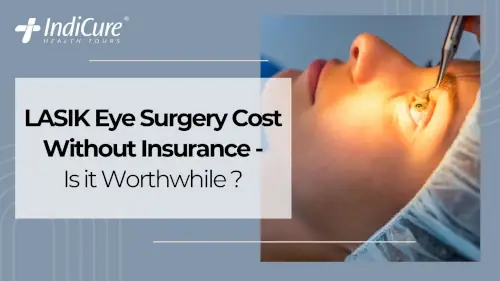LASIK Eye Surgery Cost Without Insurance - Is It Worthwhile?

LASIK eye surgery ranks among the most sought-after elective surgery procedures in the United States. More than 20 million procedures have been done to date with an average success rate of 94%. Not only does the procedure enjoy formidable satisfaction rates among patients post-surgery, but also has very low complication risk.
So, what factors make the procedure so popular? LASIK surgery offers a reliable and effective solution for vision correction making it the procedure of choice for people seeking freedom from glasses and contacts. The procedure offers several advantages- gives immediate results, has minimal downtime with negligible discomfort; provides long-term benefits with a sizable number of people achieving 20/20 vision, giving them freedom from glasses and the ability to better engage in sports and other daily activities. The biggest merit of course is the boost in the self-confidence one gets, sans the glasses.
However, the LASIK eye surgery cost without insurance may be a considerable expense, especially if you live in the United States or any other Western country.
While the benefits of LASIK eye surgery and its positive impact on quality of life are undeniable, it is worthwhile to do a cost-benefit analysis to determine whether undergoing the procedure without insurance is worth it.
LASIK Eye Surgery Cost Without Insurance
LASIK eye surgery cost without insurance is a significant question that looms large in the heads of a lot of people contemplating the surgery. While choosing the right surgeon/ clinic is one thing, the cost becomes a big factor for many, when they make their decision for LASIK surgery.
Now the question comes, is the procedure covered under insurance? Taking into account the fact that LASIK is an elective procedure and not a medical necessity, most insurance plans do not cover it. Few private health insurance policies partially cover LASIK and it can vary widely depending on your provider and policy. However, these rebates typically cover only a small fraction of the total cost, and out-of-pocket costs form a major part of the component.
Even for specific medical conditions like Astigmatism, where LASIK may be a medical necessity, securing insurance coverage for the procedure depends on the specifics of your policy. Therefore, understanding the full scope of LASIK eye surgery costs without insurance is crucial for anyone considering this life-changing procedure. While navigating the realms of LASIK eye surgery & its costs, the question comes, what is the average LASIK eye surgery cost that one can expect?
Here is a quick comparison of LASIK eye surgery cost without insurance in some of the Western countries:
| Country | Average LASIK Eye Surgery cost without insurance (per eye in USD) |
| United States | 2500 to 4000 |
| Canada | 1500 to 3000 |
| Australia | 2200 to 3500 |
| New Zealand | 2500 to 3500 |
| United Kingdom | 2200 to 3800 |
The high costs of the surgery force prospective patients to either save up for the procedure, investigate payment plans offered by eye care centres, or explore alternative financing options. Choosing the former option means waiting for years and years for the procedure, while the latter options can be quite heavy on the pocket.
For people who find the LASIK eye surgery costs without insurance unaffordable, using medical tourism may be a great option to reduce their financial burden.
Medical tourism for LASIK Surgery abroad
Those considering medical tourism to evade the high LASIK eye surgery cost without insurance in Western countries find countries like India, Thailand, Turkey, Mexico, etc as the most preferred destinations for getting LASIK surgery without insurance. There are pros and cons for each destination and due diligence is required before finalizing your surgery.
A few key considerations that must be taken into account when considering medical tourism are:
- Surgeon's Skill and Expertise: The skills of the surgeon that one chooses hold paramount importance. Choosing a Board-certified surgeon, who practises LASIK surgery regularly and has received specialized training in performing LASIK procedures is imperative.
- Accreditation of the clinic: The clinic one chooses holds as much importance as the choice of surgeon. Clinics that have international accreditations like JCI or equivalent National accreditations are typically more reliable, ensuring they meet high standards of safety, hygiene, and quality care.
- Technology and Infrastructure: Since LASIK is basically a technology-driven procedure, the kind of equipment and technology being used at the clinic is extremely important. Latest techniques like Contoura Vision, Custom LASIK, etc have better results than the traditional LASIK.
- Cost Comparison: One of the biggest factors is the cost of LASIK surgery. While choosing the destination, one ought to compare the total prices involved, including the surgery charges, surgeons' fees, pre/ post-operative care charges, etc. Besides the procedure charges, one needs to carefully take into account other expenditures associated with medical travel like flight and accommodation charges, food bills, and other regulatory expenses like visa fees, etc.
- Quality of care expected: The pre-, peri, and post-operative care that one receives at the clinic contributes greatly to the outcome of the surgery. One needs to ensure that the clinic provides thorough pre-operative assessments and detailed post-operative care instructions. Follow-up consultations with the surgeon are equally important for a seamless recovery.
- Language Barrier: Clear communication is pivotal to understanding the procedure well and following the instructions. Language barriers in countries that do not speak English may pose a huge barrier and detriment to the surgical experience.
- Health Regulations: Clinics that adhere to stringent hygiene and safety standards definitely have a better success rate in surgery. Checking the health and safety regulations of the clinic beforehand is mandatory.
Pointers for an Effective LASIK Surgery Abroad:
- Thorough Research & Planning: One should start planning for LASIK surgery abroad well in advance. One should do thorough research on the options available with due diligence on the accreditation of the clinics, surgeons' qualifications, and cost comparison. One can view the testimonials of previous patients or speak with them to learn of their experience.
- Visa & Travel Arrangements: Once the decision on the destination and surgeon/ clinic is made, one needs to check the regulations of the country, visa requirements, and other prerequisites for travel. Also, stay and travel arrangements need to be in place.
- Follow-Up Planning: It is crucial to take into consideration the details for follow-up care, how long one needs to stay in the country, and whether one needs to coordinate with an eye specialist at home country.
State-of-the-art LASIK Eye Surgery in India:
India is considered one of the most preferred medical tourism destinations for LASIK eye surgery. Home to some of the finest eye surgeons, one can expect the best results for their LASIK surgery in India. Factors that make LASIK Eye Surgery in India so popular are:

- Significant cost savings: Even though one must pay out of pocket, the LASIK eye surgery cost without insurance in India is significantly lower than in other competing medical tourism destinations. The cost of LASIK eye surgery in India starts from as low as USD 500 per eye and may vary depending on one's specific medical condition, age, and treatment technique one needs.
- State-of-the-art eye clinics: The low cost of LASIK surgery in India is in no way indicative of the quality of care, as the best eye clinics in India are equipped with state-of-the-art technology and the latest equipment.
- Access to advanced technology: Indian surgeons who have been trained Internationally, use the most advanced technology like contour vision, bladeless, and custom front LASIK. These techniques offer very high precision, have the highest success rates, and ensure you have the sharpest vision.
- Incredible India: India is considered a unique and vibrant tourism destination for travelers worldwide. An opportunity to combine leisure with surgery is regarded as a great opportunity by many.
How To Plan Your Travel for Lasik Surgery in India
India is a huge country and offers several options in terms of surgery with hugely varying ranges in terms of quality and cost. It is however imperative that one chooses the right surgeon and the right hospital that best suits your needs for safe, affordable, and quality care.
As mentioned earlier, one needs to do thorough research before finalizing the destination, the surgeon, and the clinic. However, this research would remain limited to the online available information only. Here, trustworthy medical tourism companies like IndiCure Health Tours bring great value to a medical tourist when opting for LASIK eye surgery abroad.
IndiCure Health Tours, by its extensive research on medical facilities and surgeons in India, consults and guides one about the best options available for your LASIK surgery in India. They offer remote consultations with prospective surgeons to eliminate any surprises when a medical tourist comes to India for surgery. Additionally, they make end-to-end arrangements for your travel, stay, and other concierge necessities, so that you can have complete peace of mind and can single-mindedly focus on your surgery to achieve the best results.
To sum up, while the upfront cost of LASIK surgery without insurance may seem significant, the long-term benefits and potential savings on eye care, including corrective lenses, appointments with eye specialists, etc. make it a valuable investment. Especially if one opts for LASIK surgery abroad, the cost of LASIK surgery without insurance comes drastically down, making it easier on the pocket.
With the medical tour for LASIK surgery abroad managed end to end by IndiCure Health Tours, the whole experience becomes safer and more convenient. LASIK surgery's enhanced quality of life and convenience certainly make it a worthwhile investment, even without insurance coverage.